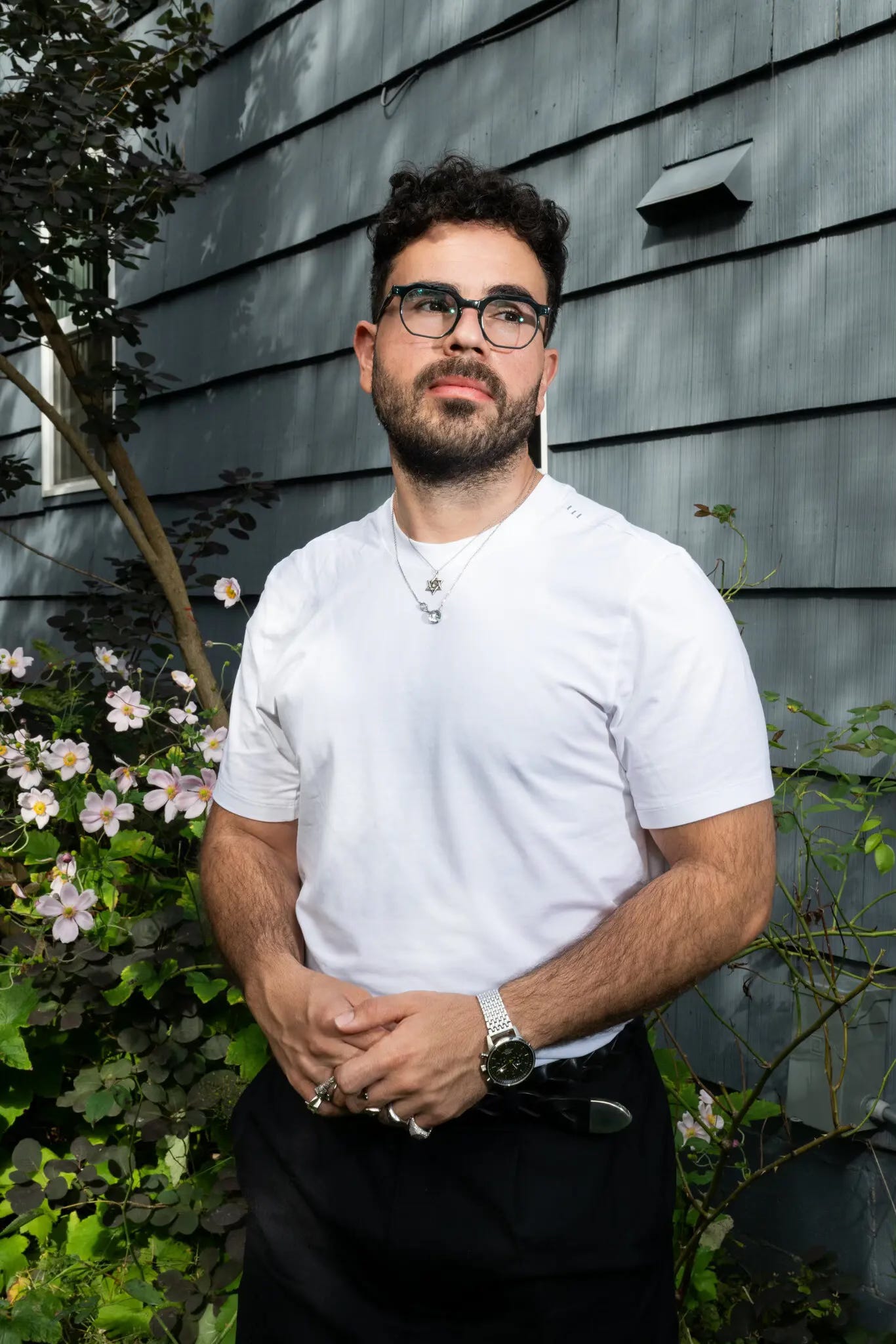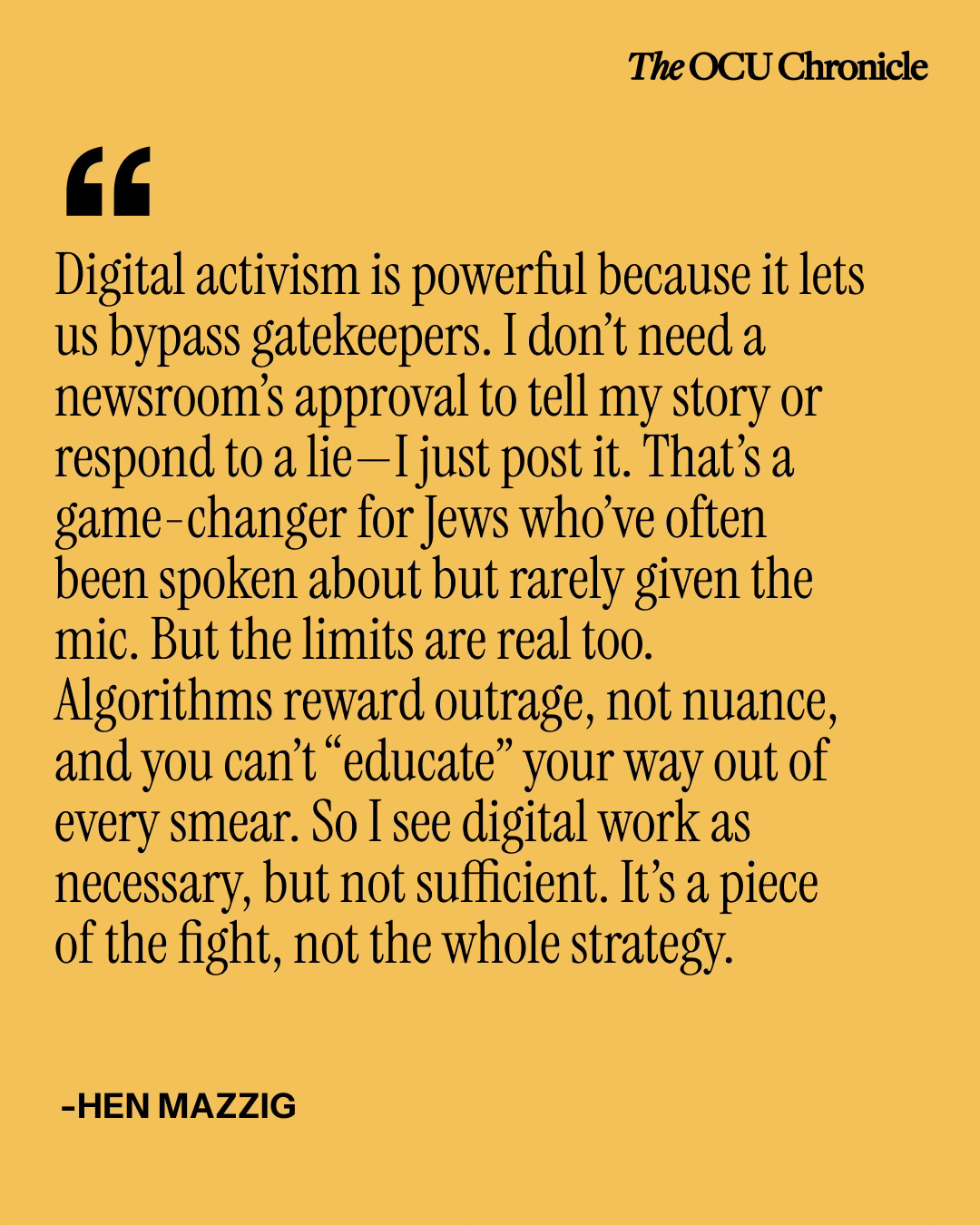Hen Mazzig Isn’t Waiting For Permission
The acclaimed activist explains how he’s fighting hate with stories, reclaiming Jewish pride, and why hope is a discipline.
Hen Mazzig has never been content with silence. As an activist, Israeli author, and son of North African and Iraqi Jewish refugees, he has carved out a singular voice for himself at the intersection of identity, history, and resistance—often on platforms not built to hold nuance. Whether confronting antisemitism online, uplifting overlooked Jewish narratives, or encouraging young people to stand tall in their truth, Mazzig doesn’t just respond to hate, he reframes the conversation in a meaningful way that we all can learn from. In this interview with The OCU Chronicle, he speaks candidly about the limits of digital activism, the strength in storytelling, and the quiet, deliberate act of choosing hope above all else.
OCUC: You’ve done incredible work combatting antisemitism on social media. What are the limits and powers of digital activism?
Hen Mazzig: Thank you. Digital activism is powerful because it lets us bypass gatekeepers. I don’t need a newsroom’s approval to tell my story or respond to a lie—I just post it. That’s a game-changer for Jews who’ve often been spoken about but rarely given the mic. But the limits are real, too. Algorithms reward outrage, not nuance, and you can’t “educate” your way out of every smear. So I see digital work as necessary, but not sufficient. It’s a piece of the fight, not the whole strategy.
OCUC: What advice do you have for young Jews who feel afraid to be openly Jewish (or Zionist) on campus or online?
Hen Mazzig: First: I see you. The fear is real. But here’s what I’ve learned: hiding won’t keep you safe, it just makes you smaller. Our identities are not liabilities. They’re sources of pride and strength. Find your people. Speak your truth. And remember: every time you show up as yourself, you make it easier for the next Jew to do the same.
OCUC: How do you combat negativity and misinformation online, on social media or otherwise?
Hen Mazzig: I meet it head-on. I don’t wait for someone else to correct the record—I do it myself, and I try to do it with clarity and conviction. Not for the trolls, but for the silent majority watching. That said, I don’t engage with every hater. You have to protect your energy. Some posts are for rebuttal. Others are for reclaiming joy.
OCUC: Much of your work is rooted in storytelling. How important is storytelling in fighting hate?
Hen Mazzig: Storytelling is the work. People can dismiss statistics or spin facts—but a human story? That sticks. That changes people. I tell mine as a Mizrahi, queer, Israeli Jew because it disrupts every box I’m supposed to fit into. And when we flood the narrative with our stories—real, messy, beautiful stories—we make it impossible to dehumanize us.
OCUC: What voices or stories about the Jewish or Israeli experience do you feel are most underrepresented in mainstream media?
Hen Mazzig: So many. Mizrahi Jews. Ethiopian Jews. Queer Jews. Jews who are Zionists and progressive. And honestly? Regular Jews, who are just trying to live their lives with dignity while the world projects every conflict onto them. The mainstream is obsessed with two types of Jews: the villain or the victim. I’m here for the voices that exist outside that binary.
OCUC: Are there any books, films, or artists you think more people should be paying attention to right now?
Hen Mazzig: Yes—Jewish creators who are breaking molds instead of performing trauma. Artists like Zoë Buckman, who blends feminism and Jewishness in bold ways. Writers like Yossi Klein Halevi. And any filmmaker who refuses to make Jews either magical sidekicks or moral lessons. We’re not here to complete someone else’s story, we have our own.
OCUC: How do you maintain optimism—or maybe, more importantly, what brings you hope?
Hen Mazzig: Hope isn’t something I find, it’s something I build. Every time I speak to a Jewish teen who’s standing up on campus, or a parent who tells me my videos gave them the language to talk to their kids, that’s hope. Hope is a discipline. I don’t always feel it, but I choose it. Because giving up has never been an option for our people.
The views, thoughts, and opinions expressed herein are solely those of the author and do not necessarily reflect the official policy, position, thoughts, or opinions of Our CampUs United (“OCU”), its affiliates, or any other individuals or entities associated with OCU.







